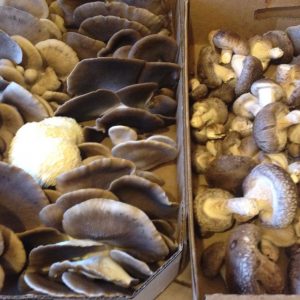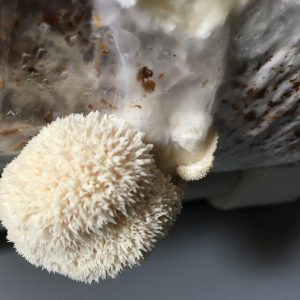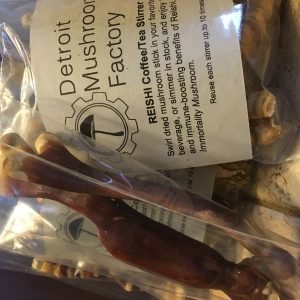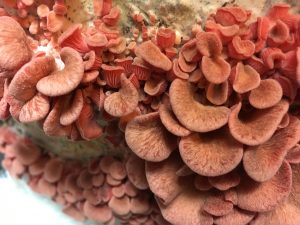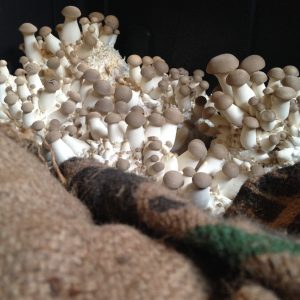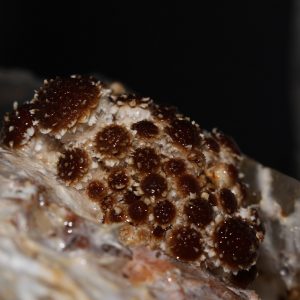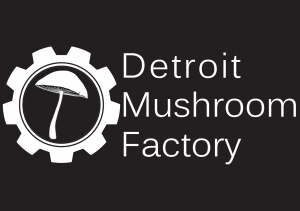The Bonfires of Social Enterprise with Romy of Gingras Global | Social Enterprise | Entrepreneurship in Detroit
«
»
S3: Detroit Mushroom Factory: Deana Wojcik & Chris Carrier #86
Manage episode 309036515 series 3025717
Detroit Mushroom Factory with Deana & Chris
Hello out there in listener land, this is Romy bringing you another episode of the Bonfires of Social Enterprise. This episode is all about mushrooms! Did you know there are all different types of mushrooms that can be grown indoors, and, that there is a mushroom factory in Detroit? Well, you will meet Deana and Chris and hear all about their story from concept to now. As customary, I also like to introduce a song from a Detroit artist at the end of each episode so stay tuned to the end.
For the full transcript – Click below
Hello out there in listener land, this is Romy bringing you another episode of the Bonfires of Social Enterprise. This episode is all about mushrooms! Did you know there are all different types of mushrooms that can be grown indoors, and, that there is a mushroom factory in Detroit? Well, you will meet Deana and Chris and hear all about their story from concept to now. As customary, I also like to introduce a song from a Detroit artist at the end of each episode so stay tuned to the end.
Okay, let’s see what Luke has for our fun fuel today…..
Hi, this is Luke Trombley, and I am bringing you the fun fuel for this episode.
Did you know that there are over 30 species of mushrooms that glow in the dark? The chemical reaction involved in this is called bioluminescence which produces a glowing light known as foxfire. Some people will use this fungi to light paths through the woods.
Thank you for listening to this fun fuel. Enjoy the episode!
Very nice Luke. Glowing in the dark….what a fungi….ha ha. Okay, Romy, enough with the bad jokes. Let’s listen in to what Deanna and Chris are up to and how this all began.
Romy:
Okay, great. Well, welcome Deana and Chris to the podcast, Bonfires of Social Enterprise. Got your cool business here. Let's talk about the Detroit Mushroom Factory.
Deana:
Great. Well thanks for having us. To just give a little background, we are a mushroom farm. We grow right now just out of our home. We live in Detroit, and we grow mushrooms in the basement.
We grow on a substrate that comprises spent brewery grain that we get donated to us from a brewery in Detroit called Detroit Beer Company, and we mix that with sawdust that we get donated to us from a local woodworker named Richard Ganas. And so those two things we combine, we add mushroom spawn, and then we grow those mushrooms and sell them, mostly to local restaurants.
Romy:
Wow. Let's go over that one more time just in case, just for terminology. So you grow the mushrooms in your basement on, what was that? It was a bent ... Say that again.
Deana:
Spent brewery grain. So when beer is brewed at a brewery, they are left over with all this grain that comes out of the mash tun and that's usually a waste stream [inaudible 00:01:26].
So our model, one of the aims of our business is to be a totally sustainable farm. And so we have committed to only growing on recycled materials and spent brewery grain is one of those materials.
Romy:
Okay. Brewery grain, just for those listening in other languages. Okay.
Deana:
Oh yeah.
Romy:
And then the sawdust. Okay. Wow, that's amazing. Do you need a lot of room for that in your basement?
Deana:
Well, we don't have it.
Chris:
I was just going to say; we have one of these old houses in Detroit. It's a four bedroom house, and it's just Deana, myself and our dog, so we really have three bedrooms and a basement and part of a backyard dedicated just to the mushrooms.
So it does take quite a bit of space, I would say. It takes quite a bit of equipment, and it's a little more complicated on the front end than maybe your traditional farming or your gardening because it requires equipment.
For instance, we take that [inaudible 00:02:34], which is usually barley, from the brewery, mix it with the sawdust and then we need to sterilize it. So the mushrooms grow in these special plastic bags that are sterilized. And so we do that in these autoclaves that are basically like big pressure cookers, and then we move that whole operation into one of our bedrooms, which has been set up, basically like a clean room, like a lab.
And so nature really does not like sterile environments. It does not like cleanliness, so we're constantly fighting things like mold and things like bacteria. Nature really likes chaos, so it's always fighting us. We want to grow our one particular mushroom where nature wants us to grow all kinds of molds and things that are always trying to get in the way.
Romy:
That's so fun! All right. So the end product is the mushrooms. How did you guys originally come up with this? I met you, what? Was it three years ago? No? Four?
Deana:
Yeah. Three years ago, I think. 2014 is when we were in our build social class and in the markets I met you.
We had the intention of starting a business when we moved to Detroit. We had both had careers in other sectors and were looking for a change. And we actually left where we were living in California and drove all around the country looking for where we wanted to live next.
So we lived out of our car for about nine months and just toured around, went to different cities that people recommended to us, went to different towns and Detroit really stood out. We really loved it here, and once we decided to settle here, we thought, "Well okay. Maybe this is the place where we can try a business experiment."
And Chris has had a lot of mushroom growing experience, even before we were in Detroit, that maybe he can talk about.
Romy:
Yeah, let's hear it, Chris.
Chris:
Sure. Yeah. I had grown mushrooms just as a hobby. I'm a person who takes hobbies way too far. So when I was in California, I got a little interested in growing mushrooms, I think I ordered a kit. And so you buy these kits online or wherever, you can get them in grocery stores now, where basically you make a little slit in a bag, and then you get mushrooms growing up. And they worked great.
But my brain immediately went to like, "Well, I can't just keep buying kits. Now I need to figure out how to make my own kits." Or something like that and so I just started learning and buying equipment. And little by little, the apartment I lived in started getting totally filled with mushroom grow bags and the entire place was just set up for growing mushrooms. It was my living space and my lab, and it's not that different from how we do it now.
Deana:
Yeah. But that's when we were first getting to know each other. So as a perspective [inaudible 00:05:19] mate ... When Chris and I first started dating, I went to his house, and a few flags went up because there were mushrooms growing out of phone books and there's an old trunk with mushrooms growing out of it.
He won me over, he did. He made me a delicious dinner out of mushrooms that he had grown himself and so he won in the end. But it was a lot to take in at the beginning.
Chris:
People talk about when they're kids; they want to be a fireman or an astronaut or whatever. I wanted to be a mad scientist. I would take everything and mix it together. I took all the chicken poo and all the whatever, all the mouthwash and I mixed it together.
Luckily none of it was ... there was no bleach and ammonia or something.
Romy:
Right!
Chris:
But I wanted to mix everything together and see what would happen and entirely nothing happened. Now that I've gotten older, I think the mushrooms really rekindle that because, like I said, it's difficult in some ways, but it requires a lot of really weird equipment, and it's just strange in a lot of ways.
So it just tickles me in that way, in that same mad scientistic way.
Romy:
That's so fun.
Deana:
When we got to Detroit, we were really taken with how much urban farming is going on here, and that was part of why we fell in love with the city. And when we were conceiving of our business, we wanted to find a way to fit into that urban farming community without directly competing with other growers, because it's hard to make your living growing kale and there's a lot of people trying to do it.
And so it felt like we had this unique way to fit into the market because there aren't really other people growing mushrooms for commercial sales within the city. And so that felt like our niche and Chris had the experience, we had some of the equipment.
My background was as an educator, so I quickly wanted to learn as much as I could and help other people understand the process and it just kind of snowballed from there. Now we have a house filled with mushrooms.
Romy:
Right.
Deana:
We arrived here somehow.
Romy:
And it sounds like you've got some customers. You said restaurants are starting to buy them, right?
Deana:
Yeah. We've been so overwhelmed and grateful by the support of the restaurants in the city. From the very beginning, really before we had our act together before we were taking ourselves seriously as a business, we kind of sheepishly mentioned to a couple of restaurants that we liked to eat at that we were trying to be a mushroom farm. And immediately they just open arms, welcomed us, said they would buy whatever we had.
So we've had some really loyal customers from the very beginning. Rose's Fine Food has been buying our mushrooms since before we had mushrooms, basically. Their owner, Molly Mitchell said, "Whatever you have I'll buy." And they've been so supportive and so patient. Sometimes we have them; sometimes we don't.
And then as the local food landscape has grown even more in the city, other restaurants have gotten in touch and been interested. Sister Pie uses our mushrooms sometimes, Brooklyn Street Local is a very committed customer. We sell through Grown in Detroit, which is a co-op of growers at Eastern Market.
So we've been really lucky. We have a lot of different outlets, and people seem willing to go that extra mile to support local farmers, and that's why we're in business.
Romy:
Yeah. Wow, that's a good word. This is an odd question from somebody who doesn't understand your business, but does anyone have any trouble with the fact that you're growing them in your home? Because usually, it's probably better than just out in the random woods, right?
Deana:
Yeah. I don't think that's a-
Chris:
Yeah, I was just going to say, people certainly self-forage mushrooms. It's an entirely different set of skills. Foraging mushrooms and identifying them is really, really complicated in its own way. So the way we grow right now is, it's a business on the way to becoming a business.
We came in with maybe the most important quality for new business owners or new business founders, which is, we were utterly naive about how difficult it was going to be. And we often talk to each other, and we say, "If we knew all of what we have to deal with now then, would we have even have done it?" Because a lot of what we're trying to do now is grow.
So we grow in our house, but we're not producing at nearly the level we need to really have a business that can support our demand and ourselves. So we also have this warehouse that we purchased two years now? A year ago? Also in Detroit.
Deana:
Last July. Yes.
Chris:
Last July. About five minutes from our house, in the north end of Detroit.
Chris:
About five minutes from my house, in kind of the North end of Detroit. And so now we're trying to move basically from a large, hobby farm into a small true production farm, and just learning so much about the challenges that that poses, and very few of them so far are about growing mushrooms. It's about developing this building that's seen better days and growing, just continuing to grow, be aggressive.
Romy:
Yeah, that's so good. I love what you just said. I mean while you're growing mushrooms, you're trying to grow your business. It's like, there's always more shenanigans that happen than just the running the business part than I think people understand. It's just everything from the financial part, to operations, execution, marketing, communications, and I mean, oh my gosh, what about customer service?
Chris:
Right.
Romy:
So it's like everything. It's a lot when you're a small team trying to scale at least even just to the next step.
Chris:
Yeah, and it's funny-
Deana:
Right.
Chris:
How little of it ends up being like ... I'm a software engineer, that's my background, so I'm technical. I want the problem ... I wanted to grow better mushrooms, and it's amazing how little, at least early on, that is the problem. It becomes ... it's about running a business that's [inaudible 00:11:22] more so. Your passion takes you to a certain point and then you have to say, "Okay, now I gotta like do my books, and I gotta do the taxes, and we have to find funding, and we have
98 episod
